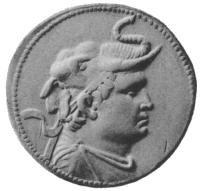Greco-Bactrian Kingdom
The Greco-Bactrians were a dynasty of Greek kings who controlled Bactria, an area comprising today's northern Afghanistan and parts of Central Asia, the easternmost area of the Hellenistic world, from 250 to 125 BC. Their expansion into northern India established the Indo-Greek Kingdom, which was to last until around 1 BC.
The Euthydemid dynasty
The dynasty (known as Euthydemid, after king Euthydemus) was founded by the Bactrian military governor Diodotus around 250 BC when he wrestled independence for his territory from the Seleucid Empire.
The Greco-Bactrians were known for they high level of Hellenistic sophistication, and kept regular contact with both the Mediterranean and neighbouring India.
The Indo-Greek branch

One of the Greco-Bactrian Euthydemids, Demetrius, started an invasion of the Mauryan empire in Northwestern India from 180 BC, and seems to have been as far as the imperial capital Pataliputra in eastern India (today Patna). The invasion was completed by 175 BC This established in northern India what is called the Indo-Greek Kingdom, which lasted for almost two centuries until around 1 BC.
Menander, after Demetrius, ruled from 150 to 135 BC. He seems to have converted to Buddhism, and is described in Buddhist texts as a great benefactor of the religion. He is famous for his dialogues with the Buddhist monk Nagasena, called the Milinda Panha.
Downfall
From 130 BC, Indo-European nomads (the Scythians and then the Yuezhi), started to invade Bactria from the north.
In 125 BC the king Heliocles abandonned Bactria and moved his capital to the Kabul valley, from where he ruled his Indian holdings. He is technically the last Greco-Bactrian king, although the Indo-Greek Kingdom continued in northern India until around 1 BC.
The Yuezhi remained in Bactria, where they were to stay more than a century. They became Hellenized to some degree, as suggested by their adoption of the Greek alphabet and by some remaining coins, minted in the style of the Greco-Bactrian kings, with the text in Greek.
The Yuezhi were then to move to northern India where they established the Kushan Empire.
Main Greco-Bactrian kings
Diodotos I (250-230 BC)
Diodotus II (250-230 BC) Son of Diodotus I
Euthydemus I (230-200 BC) Overthrew Diodotus I.
Demetrius I (200-180 BC) Son of Euthymedus I. Conqueror of India.
Antimachus I (171-160 BC) Brother of Demetrius I. Lost against rebel Eucratides.
Eucratides (171-145 BC)
Eucratides II (145-140 BC)
Plato (145-140 BC)
Heliocles (c.a. 125 BC) Last "Bactrian" king.
See also:
Greco-Buddhism
Seleucid Empire
Indo-Greek Kingdom
Yuezhi
Indo-Scythians
Indo-Parthian Kingdom
References:
- "The Shape of Ancient Thought. Comparative studies in Greek and Indian Philosophies" by Thomas McEvilly (Allworth Press and the School of Visual Arts, 2002)